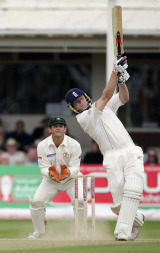The Leading Cricketer in the World - Andrew Flintoff
Simon Barnes
The Leading Cricketer in the World was instituted in Wisden 2004. Players
can be chosen more than once for this award, although no one has been -
yet. The two previous winners were Ricky Ponting and Shane Warne.
|
|

|
The old legend of Andrew Flintoff is The Man Who Changed: the man who belatedly came to the realisation that talent alone was not enough. So he added application and resolution to the mix and became one of the best cricketers in the world.
But the new legend is better. It tells of the man who changed again, and made a still more momentous leap. He had gone from jolly good to excellent - well, many others have done that. But during the Ashes series of 2005, Flintoff then made the infinitely rarer transition - the quantum, the Beamon leap - from excellence to greatness.
How to explain the concept? Not by numbers, certainly. Great players always have great numbers: but so do many players of mere excellence. A great player is one who dominates - and wins - a great cricket competition by means of his own performances, his own nature, his own force. Flintoff and the Ashes series of 2005 will always be regarded as a perfect demonstration of cricketing greatness.
He made the transition somewhere between July 24 and August 4: between the end of the First Test, and the beginning of the Second. He bowled well at Lord's. But his batting was meek and deferential, that of a man who knows he is second-best. Australia won, Flintoff made three runs in the match and was part of England's ghastly same-old-Poms collapse in the second innings.
So what happened? Like a cuckolded husband, Flintoff was the last to know. He just came out to bat on the first day of the Second Test and took over the series. He brought off the rare all-rounder's double of succeeding in both disciplines in the same match.
|
|

|
His bowling had gone from useful-third-seamer to firecracker strike bowler. He had found pace, he had found subtlety, he had found the psychological domination he had never before possessed. His batting became filled with a massive, easy confidence. There was no swagger: just a huge relish for the confrontation, and an inner certainty about his newly acquired greatness.
This was most perfectly demonstrated in his series-turning innings of the Fourth Test, when he compiled - rather than swatted or biffed or bludgeoned - a century of murderous purpose. It was an innings that did more than score runs: it brought the beginnings of despair to the opposition. Flintoff was exceptional in the final match too, when his extraordinary last spell brought the Australians from dominance back to uncertainty.
Flintoff performed well in everything he did last season, but it was his personal epic of the Ashes summer - The Freddiad? - that was the real expression of his greatness. Everything else was peripheral. The subtle balance between the two sides was tipped by the performances of one man. With, if you must have it, 24 wickets and 402 runs.
The only possible rival for the title of the world's leading cricketer is Shane Warne. Warne is one of the greatest cricketers that ever lived, and had the best year of any bowler in history, with 96 Test wickets. Statistically, he has the better claim.
But in the brutal arithmetic of sport, the fact is that, in the greatest competition of them all, Warne's team lost and Flintoff 's team won. It really is that simple. Had Kevin Pietersen not staged his innings of rescue, the result of the Test series and the destination of the title of leading cricketer would have been different. But then Pietersen was dropped on 15. Warne dropped him. This was England's summer: and, unarguably, if by the finest of margins, Flintoff 's year.

